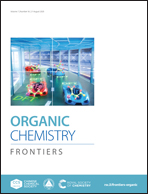Optimizing chemical reaction conditions using deep learning: a case study for the Suzuki–Miyaura cross-coupling reaction†
Abstract
Here we report a feasibility study of a deep learning model for exploring the optimal reaction conditions for given chemical reactions. The model was trained to learn the relationships between the chemical contexts, reaction conditions and product yields based on high-quality existing experimental data, and then extrapolate reasonably to unseen reactions by in silico exploration of accessible reaction space. This strategy was applied to the Suzuki–Miyaura cross-coupling reaction to find the best catalysts for given reactants and at the same time to discover the optimum combination of the reaction conditions. We demonstrated that the trained model was able to determine the productive catalysts as well as the most favorable catalyst loading and reaction temperature for both modeled reactions and external unseen reactions. This work aims to provide an insight into the feasibility of introducing a deep learning method in the optimization of chemical reaction conditions.



 Please wait while we load your content...
Please wait while we load your content...